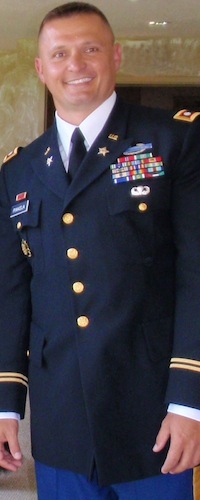 |
| Kenneth Pinkela |
Good afternoon. My name is Kenneth Pinkela. I am a Lieutenant Colonel in the United States Army and I have HIV. I am here today just three weeks after being released from an Army prison at Fort Leavenworth, Kansas, after serving 272 days. I was not charged with infecting anyone, but with aggravated assault solely because of an accusation that I exposed someone to HIV.
I want to thank you—on behalf of my family, friends, neighbors, and co-workers, both civilian and military, all of whom have been affected by my prosecution—for having demonstrated such leadership with the passage of the criminalization resolution at your February meeting.
What did or did not happen, between me and the person who accused me, did not matter to the Army. Two things mattered: 1) I was accused, and 2) I have HIV. The prosecution’s case was focused almost solely on proving that I had HIV; the military court would not allow my counsel to introduce critical evidence, as well as physical and medical evidence.
The prosecutor said, and I am quoting directly here, “where there is smoke there is fire...you are HIV positive so it must have been you.”
Now I am a convicted felon and registered sex offender. My 26-year career of service and sacrifice to my Nation—including a stint as the Army’s legislative liaison to the U.S. House of Representatives—is gone.
No job. No retirement benefits. No access to medical care for either combat injuries I have suffered or other health needs, like treating HIV. Not even a flag for my coffin when I die. My ability to care for my family and our future is in jeopardy. My case is pending in the military appeals process, and we pray that that process will right this wrong. But the damage that has already been inflicted on my life, family, friends and reputation can never be corrected.
The Uniform Code of Military Justice (UCMJ) does not have an HIV specific article or statute. But individual convening authorities and military prosecutors can and do use HIV as the reason to prosecute under other articles of the code.
The UCMJ is supposed to represent the will of Congress, and of the Commander in Chief, to provide for the good order, conduct and discipline of the Armed Forces. I hope you will join me in questioning whether this kind of prosecution truly represents the will of Congress, the Commander in Chief and of the nation?”
While I realize PACHA is an advisory council to the President, I am asking that you also use the power of your bully pulpit and send a letter and copy of your resolution directly to Secretary Sebelius and to the Chairman of the Joint Chiefs of Staff, urging their immediate attention to this injustice to those serving in the armed forces as well as to the nation.
I hope you will ask the President, my Commander in Chief, to stop these harmful prosecutions by executive order, prohibiting the use of HIV as justification for a prosecution, and protect the men and women in uniform who have HIV and serve their nation with honor everyday. I hope you will ask the Commander in Chief and the Chairman of the Joint Chiefs of Staff to review military prosecutions based on the HIV status of the person charged and, as is appropriate, consider executive clemency, pardon or sentence reconsideration.
I am committed to helping PACHA and Members of Congress like Congresswoman Barbara Lee continue to fight to develop and pass meaningful legislation that will help protect our Nation and not discriminate people based solely on having HIV.
Thank you for your time, and thank you for your service.
Kenneth A. R. Pinkela
LTC, USA






38 Comments
38 Comments